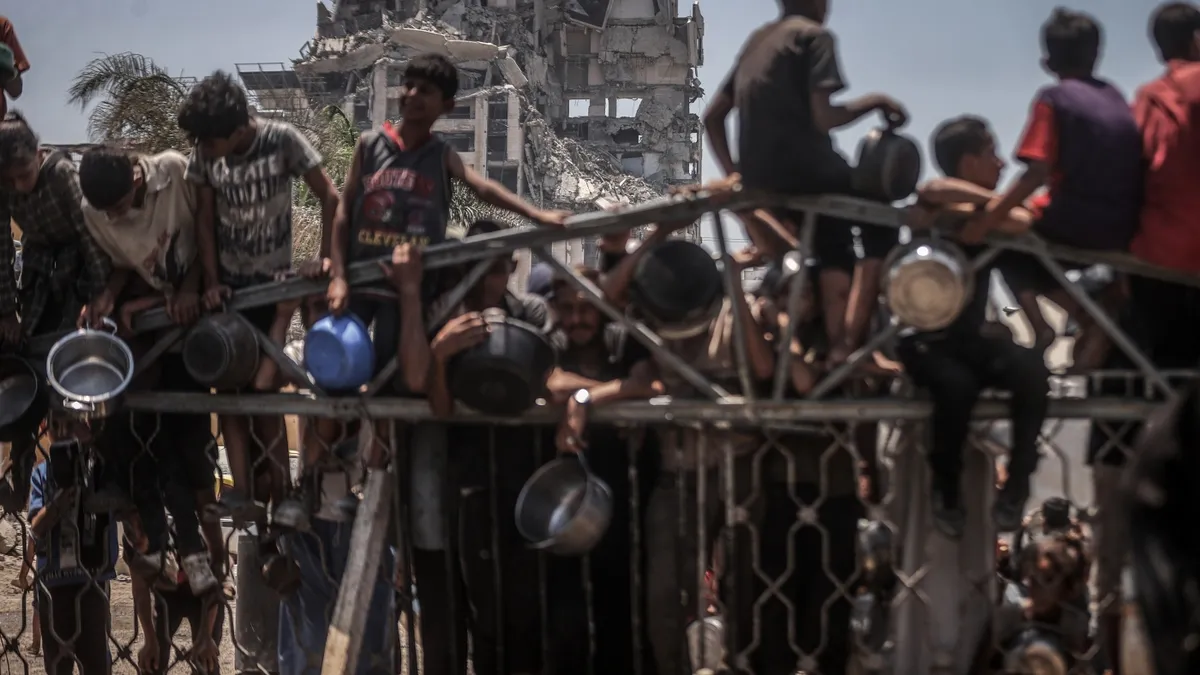
Amjad Al Shawa has dedicated his career to coordinating humanitarian aid in Gaza. As the director of the Palestinian NGO Network, he has tirelessly worked to ensure that vital resources such as food, water, and medicine reach those in desperate need. He is recognized as a critical link between various civil society organizations in the region. However, Al Shawa now finds himself trapped in northern Gaza, struggling to provide even the most basic necessities for his own family amidst a deteriorating situation.
In an interview with NPR's Michel Martin on July 28, Al Shawa described the dire circumstances he and his family face daily. “We are managing ourselves, with one meal, which could be some rice,” he shared. Just the day before, he spent approximately $60 on two dishes of salad for his family, which includes his wife and three children. The food system in Gaza has effectively collapsed, choked by Israeli restrictions on aid, resulting in the disappearance of basic staples like milk, vegetables, and fresh fruit. Bread has become a rare commodity, with a kilo of flour now costing around $20, while sugar has skyrocketed to $120.
In light of the overwhelming evidence of hardship, Israeli military spokesperson Brig. Gen. Effie Defrin responded to allegations of intentional starvation, stating, “We are not starving anyone. It's not an aim. We are fighting Hamas.” He accused Hamas of using the civilian population as a human shield to wage a campaign of starvation against Israel. The Israeli Defense Forces (IDF) assert that they continue to conduct humanitarian operations in Gaza, labeling claims of deliberate starvation as false.
Al Shawa's account comes at a time when international monitors warn that famine could soon be declared in parts of Gaza. According to the UN-backed IPC classification, over 470,000 people, approximately one in five residents, are currently living in catastrophic hunger conditions. Furthermore, two prominent Israeli human rights organizations have accused their own government of committing genocide in Gaza, a serious allegation that the Israeli government has firmly denied for over two years.
The infrastructure surrounding Al Shawa, like much of Gaza, lies in ruins. “I was displaced for 15 months, and when I returned, I found extensive damage in my home and in other neighborhoods,” he recounted. “There is so much rubble around me, and tents are scattered throughout every corner and road.” He fears that the worst is yet to come, predicting that thousands could die of starvation in the coming days.
Discussing the access to food and water, Al Shawa lamented, “The one meal that we used to have for the past four months has disappeared due to a severe shortage of food supplies.” He explained that their diet now consists mainly of bread and rice, with no fresh food available. With approximately 55,000 babies in Gaza, many mothers are struggling to feed their children, as there is a critical shortage of milk. Some mothers resort to boiling rice to feed their infants.
With the situation worsening, Al Shawa emphasized the urgent need for comprehensive humanitarian aid. “We need everything. Everything,” he declared. “I cannot separate food from water, hygiene, and medicine. All these essentials must come together.” He has reached out for professional assistance in nutrition, urging for experts to come to Gaza with the necessary supplies to save lives.
The humanitarian crisis in Gaza is a pressing issue that requires immediate attention and action. Al Shawa's firsthand account highlights the dire need for support and resources as families struggle to survive amidst overwhelming challenges. As the situation continues to evolve, the international community must respond to alleviate the suffering of those affected by this ongoing conflict.